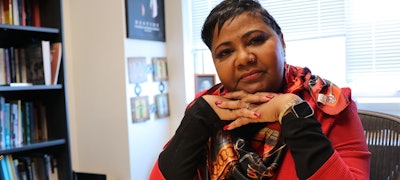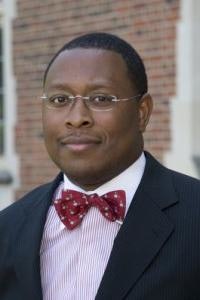 Dr. Don Pope-Davis
Dr. Don Pope-Davis
The historical proliferation of these assessments was spurred in part by French schools in the early 1900s, as white psychologists and psychometricians began to develop early theories and conjectures of learning, and to simultaneously acquire initial beliefs of intelligence, which remain today. Those children who did not pass were deemed “imbeciles” and removed from classrooms. The genesis of the testing movement created many tests, including the Stanford-Binet Test, which subsequently has been administered to millions of American schoolchildren. Also, all immigrants who came to the United States in the early 20th century via Ellis Island were given the Feature Profile Test on American history. Those who did not pass the test were called “feebleminded” and frequently sent back home.
Problematically, intelligence, aptitude and achievement tests are still used with dismissiveness. This continues a legacy of blatant disregard for cultural, linguistic and environmental influences in children’s development, resulting in subsequent interpretations and uses of scores — scores that often differ across racial, ethnic, linguistic and economic backgrounds. Social scientists like Herrnstein and Murray seized the moment in 1994 to capitalize on polemic, deficit-oriented and racist beliefs in their highly supported and highly contested book reminiscent of eugenics advocates.  Dr. Donna Y. Ford
Dr. Donna Y. Ford
Within this context, the American Psychological Association (APA) recently issued a long-overdue apology for the harm the organization and its member psychologists have done in perpetuating systematic racism and its complicit role in exacerbating myths around racial hierarchies, particularly regarding Black communities. APA acknowledges its role in perpetuating racism under the guise of science and the façade of objectivity. The association now more directly proclaims that “race is a social construct with no underlying genetic or biological basis.”
As Black scholars and leaders in psychology, counseling and education, we strive to expose and mitigate barriers that regularly inhibit educational progress and outcomes for Black and other vulnerable groups. With this in mind, we challenge prevailing moral and social beliefs that permeate institutions. We endeavor to shape more reasonable and moral standards that address structural racism that has served to maintain the status quo.
The Association of Black Psychologists also issued a response. They concluded: “To accept the APA’s apology would be to accept the accuracy of a fabricated historical record and negate the mission and vision of the Association of Black Psychologists.” To our disappointment, to date, responses from other professional organizations are noticeably absent. One exception is the American Psychiatric Association.
Individuals and organizations should not be silent. Instead, we must “speak truth to power” and work in coalition toward a path forward, proactively and unapologetically grounded in anti-racism. The healing is in the pain. We believe that APA leadership, in collaboration with other organizations, should take a next step by establishing a Truth and Reconciliation Commission similar to South Africa’s in 1995. That commission helped accelerate the healing process in the aftermath of apartheid. This will take effort, but the “urgency of now” is upon us.
Regardless of APA’s apologetic treatise, the lethal effects of oppressive psychological science still exist and remain an often-debilitating force in the lives of Blacks and other communities of color. Out of psychology and education have emerged a series of theories, tests, beliefs and practices that permeate every facet and level of the American education system, preschool to postsecondary and beyond. The work of early White psychological science ‘pioneers’ such as Alfred Binet, Lewis Terman and Carl Brigham spawned an array of aptitude tests, achievement assessments and college entrance examinations that still dictate the educational and vocational options for millions worldwide.
Such tests — often normed on the experiences, verbal and non-verbal language and culture of White people — favor White, upper-income individuals while disadvantaging other demographic groups. Even with test revisions and updates, they continue to fall short in equitable and culturally responsive ways, as witnessed by limited educational access afforded to students of color and English Language Learners. It is no wonder that we and many scholars still call for more effective and inclusive systems of assessments.  Dr. James L. Moore III
Dr. James L. Moore III
Let us be clear. The tests are not the sole issue. Instead, the issue is how people — professionals — use them in isolation of other critical information. The results are often taken too literally by educators, who use the tests to validate their expectations of minoritized groups. Reification is prevalent. They are used to hinder access to gifted and talented programs, courses for advanced learners and access to higher education in general. Conversely, how tests are used plays a dominant role in the over-representation of Black students in stigmatized categories of special education. This is associated, along with excessive disciplining and hyper-policing of Black bodies in academic settings, with the school-to-prison pipeline.
The high-stakes decisions made by testing are carried by students for a lifetime. And so, the missteps outlined in the APA apology continue to reverberate through American schools, impacting our children, their potential and outcomes, as well as the achievement and progress of our entire nation. Therefore, the attitudes and perceptions about minoritized groups must be examined, and a systematic review should be undertaken of training and pedagogical approaches used in educational institutions.
The association’s apology should have happened decades ago. The opportunity presented itself when the Civil Rights Act passed, during so many discussions of psychological health and well-being and, nearly two years ago, when George Floyd was murdered. Because of the outsized influence of psychology in other disciplines, organizations should self-examine and follow suit, including the National Association for Gifted Children, Council for Exceptional Children, National Association for the Education of Young Children, American Educational Research Association and the American Counseling Association, to name a few. All have observed their members’ impact on education and life outcomes using misguided “science” rooted in racist ideology. It is time to come clean, recognize our complex history and outline a path forward that is indicative of an authentic and sincere apology that leads to new possibilities.
Issuing statements does not fix the historical harm done. To make meaningful change, we must do the hard and messy work of examining the impact and finding commensurate solutions by going deep and wide. Lukewarm, band-aid solutions will not suffice. Gone is the time for allyship that only leads to more webinars with little outcome and accountability. The APA and education field can broadly begin here: Assess who uses psychological tests today, and how. Examine how life-changing decisions are made based on the results. Evaluate how their implementation allows some people to treat others unjustly.
We have the research tools and, hopefully now the will, to guide education, psychology and other disciplines toward equity and inclusive excellence. But the question remains: Will we take this crucial opportunity to do more than simply say, “We’re sorry”? Now, more than ever, we must move along the arc of the moral universe.
Dr. Don Pope-Davis, is Dean of the College of Education and Human Ecology at The Ohio State University
Dr. James L. Moore III, is Vice Provost for Diversity and Inclusion and Chief Diversity Officer at The Ohio State University
Dr. Donna Y. Ford, is Distinguished Professor of Education and Human Ecology, at The Ohio State University















